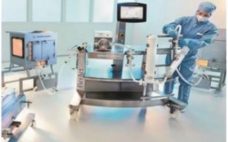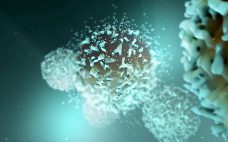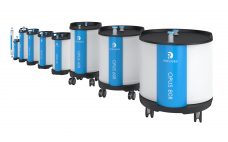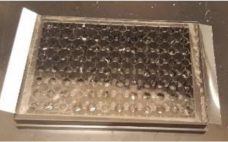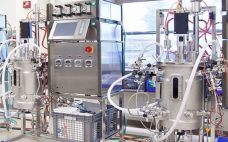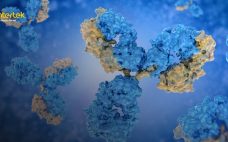This webcast features: David Cetlin, CEO, MockV Solutions and John Li, Staff Scientist, Thermo Fisher Scientific To determine the viral clearance efficacy of biomanufacturing steps, mammalian viruses are “spiked” into in-process solutions, processed and analysed for reduction. Due to the infectious nature of these live viruses, “spiking studies” are typically conducted in specialized BSL-2 facilities. The costs and logistics associated limit viral clearance analysis during process development and characterization. To overcome this challenge, a non-infectious Minute Virus of Mice –…
Webinars
Multi-Product Facility Realized by Modular Automation Platform
This webcast features: Dr. Burkhard Joksch, Product Manager, Bioprocess Automation at Sartorius Stedim Biotech GmbH, and Dr. Stuart Tindal, Product Manager, FlexAct® Platform at Sartorius Stedim Biotech GmbH Multi-product facilities need modular package units to realize fast change-over without reducing product quality and process performance. Smart modular package units such as the FlexAct® platform can run pre-qualified and pre-tested recipes, users can rapidly integrate Sartorius Stedim Biotech’s and other manufacturers’ single-use technology in bioprocess operations, achieving faster installations with reduced…
ekko™: How Acoustics Cell Processing is Changing Cell and Gene Manufacturing
This presentation features: Kevin Lannon, Director of Global Sales, FloDesign Sonics With an ever-increasing number of cell and gene therapies approaching commercialization, the industry is looking for scalable manufacturing solutions. In order to truly see a step change in improvement, it is crucial for tool providers to design equipment specifically for the GMP environment and the unique needs of cell and gene processing. This presentation will outline: How acoustophoresis and the ekko™ platform is changing the cell processing paradigm Overview…
Development of Affinity Chromatography Adsorbents for Bioseparations
This webcast features: Patrick Gurgel, Head of Research & Development, Prometic Bioseparations. Affinity chromatography has a long history of use in bioprocesses and is a powerful tool in making industrial processes more efficient by reducing the number of steps necessary to achieve the desired target purity and yield. It is common, however, for teams to only consider affinity chromatography as an alternative once other options have been considered, evaluated, and discarded, which translates into a need to develop affinity adsorbents…
From 1mL-100L: Consistent Chromatography Performance Across Multiple Sizes of Pre-Packed Columns
This webcast features: Fletcher Malcom, Product Line Leader, Repligen With the increasing use of pre-packed columns in protein separations, it is critical to demonstrate consistent chromatographic performance at different scales. This allows for seamless process scale-up and scale-down. This webinar will show how chromatography separation remains unchanged across different OPUS® Column sizes. Performance results obtained with bench-scale columns (≥1mL column volume) are demonstrated to be scalable to production sized columns (≤100L column volume). Watch the recorded webcast below.
Shortening Timelines and Reducing Headaches by Developing a Clinical Trial Strategy Earlier During Drug Development
This webcast features: Kristen DeVito, Global Director, Clinical Supply Services, Catalent Pharma Solutions Biologic clinical trials can be complex with many factors to consider. Understanding your specific needs and developing a plan early on during drug development can reduce delays and missteps during clinical trials. This presentation will discuss: How protocol design can impact clinical supply strategy Which clinical supply variables are most likely to be on the critical path Proactive steps to ensure continuity of supply and reduce the…
Don’t Just Pass the Baton: Comprehensive Capabilities and Parallel Processes Accelerate Biologic Development Timelines
Biologic drug development from DNA to commercialization involves many moving parts, which can be difficult for companies to coordinate. For example, there are often new expert stakeholders introduced during each stage of development, leading to inefficiencies and confusion. However, with deep expertise and effective communication between teams, companies can reduce risk and shorten time to clinic and, subsequently, to market. In this webinar series, three biologics subject matter experts will discuss critical considerations in their respective areas of expertise: drug…
Integrated Solutions for Biologics Formulation and Drug Product Development
This webcast features: Dr. Yunsong (Frank) Li, Director of Process Development, Catalent Biologics There are many challenges to conduct thorough drug product formulation development at early stage drug substance process development. Those challenges include material limitation, suitable analytical method, time and labor cost. Sufficient development of the right formulation and dosage form for biologics products early on helps to avoid formulation redevelopment and change during the later stage of product development, which leads to additional analytical, pharmacokinetics or even clinical…
Enabling Success in Biologic Drug Substance Development and Biomanufacturing by Leveraging Expertise and Collaboration
This webcast features: Steven Perry, PE, Senior Director of Manufacturing Sciences, Catalent Biologics Biologic drug substance development and biomanufacturing is a critical step in the long, complex pathway to approval. There are many considerations to be made around cell line and process development, analytical testing and late stage activities such as process characterization and validation. This presentation discusses: Critical drug substance resource needs of sponsor companies How expertise and collaboration amongst the key stakeholders enables successful development and scale up…
Current Analytical Approaches to Biophysical Characterization in a Regulatory Environment
This webcast features: Dr. Anshuman Shukla is Intertek’s Biophysical Characterisation expert at the Center of Excellence for Biopharmaceuticals in Manchester, UK. Structural integrity of protein based therapeutics is one of the major challenges in the biopharmaceutical industry where multiple factors such as the stability, efficacy and shelf life could be affected following minor changes in manufacturing process. This becomes critical particularly with development of more and more biosimilars where comparability to a reference product is required to ensure that the…


